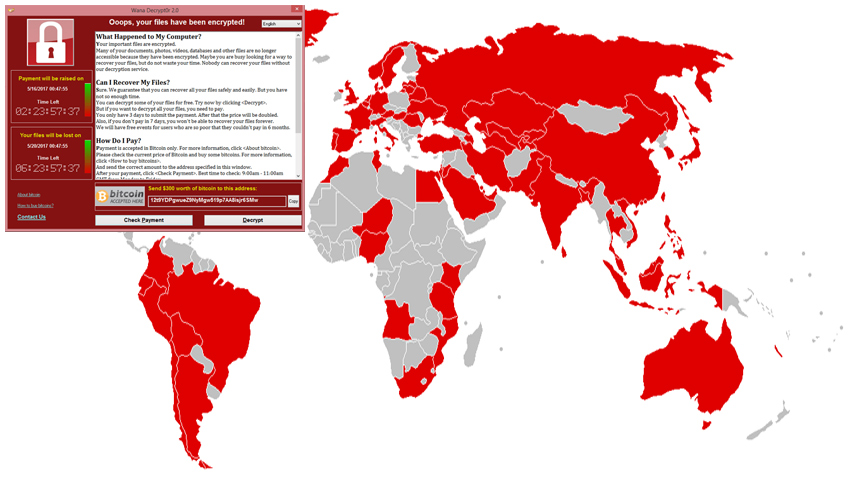It would be next to impossible to find even one internet user who has never been the target of cyber-attack. Of this, cyber security experts have no doubt whatsoever. They say that there are two kinds of people and companies – the kind that know they have been targeted, and the kind that never find out they have. In other words – in our day, everyone is getting hacked.
Efforts are now being focused on an adequate formulation of the different kinds and types of attacks and the reaction by the people hacked. The latest notorious virus was WannaCry which encrypted all files and IT systems on the computer infected, demanding a ransom of 300 dollars to restore access. The odd thing was that in this case, money obviously was not the objective, because even when the ransom was paid, the users were not given a key to unlock their IT system, cyber-security experts say. But what made this attack so extraordinary was the speed at which it spread around the world, illustrating the fact that the pace of technological change really has made a global village out of this world, in which all IT systems are connected. A simple virus like WannaCry showed us that if tomorrow there were to be another, more advanced attack, it could spell disaster for the economy and users would be unprepared and would not know how to react.

To raise awareness and help keep Bulgarians informed on cyber-attacks, the State e-Government Agency launched a national cyber-hygiene campaign “They will not hack me”. The campaign, under the patronage of European Commissioner for Digital Economy and Society Mariya Gabriel, will run through the Bulgarian Presidency of the Council of the EU until mid-2018.
The public campaign aims to reach out to as many Internet users in Bulgaria as possible. According to National Statistical Institute data for 2017, almost 62 percent of Bulgarians use the Internet regularly, and over 67 percent of households have high-speed broadband. That is one advantage that the “They will not hack me” campaign has – that it is taking place primarily online which means it consumes a minimum of financial and human resources. The campaign’s main aim is to popularize simple but effective rules of cyber-hygiene capable of reducing the risks to any member of the public and hence – to organizations in the public sector and to businesses, which are at risk most when online.
“Of course, it is not possible to be protected to such an extent that you will never be targeted by hackers, because attacks nowadays are very advanced and sophisticated,” says Iva Nedelcheva, expert at the State e-Government Agency. “The best protected systems can be infiltrated. The idea of the campaign is not to promise that we shall not be hacked, it is to focus on elementary cyber-hygiene habits. Any information we share digitally is vulnerable. Just as we try to protect our identity in the real world – our wallet, our bag, how much information we give out and where – we must act exactly the same way online. We should know there is someone somewhere watching us and we must be very aware of the choice of websites we make, or when we search for a film or a song we can’t find. That will take us to websites whose origin is unclear. The most important thing when we surf the Internet is to see whether the website has a security certificate. Not that this will mean we are 100 percent protected, but it does give a guarantee that someone has made the efforts to protect us.”
“There are websites that help us realize the complexity of the encryption used for the cyber-theft,” says Dinela Kaitazka, also an expert at the State e-Government Agency. She says that before seeking help, you should make sure you are not the target of a fake cyber-attack, because that is something you can ward off by your own effort, by reading up on the subject.
English version: Milena Daynova
The clock on the facade of the State Puppet Theatre in Stara Zagora has long been a symbol of the city. It was set in motion in 1977 and is unique on the Balkan Peninsula. The theatre recently shared details about the clock on its Facebook page after..
"Every day, we should think about peace and the messages that politicians send,” journalist Tsvetana Paskaleva, who has been living in Armenia for 30 years, says. "The situation around us and in neighbouring countries is unstable and..
Conservationists from Bulgaria Bird Walks are organising a birdwatching walk in Varna today to observe water fowl and forest birds. Two walks are planned in the Sea Garden at 9.00 and 13.00. There will be similar outings every month in the city, said..
From the first attempts to fly with homemade wings back in the 19th century, to the world's first combat flights with reconnaissance and bombing..
Dear friends, we are happy to announce that the Bulgarian National Radio’s QSL cards for 2025 are now available. The two series – one with 6 postcards..

+359 2 9336 661
